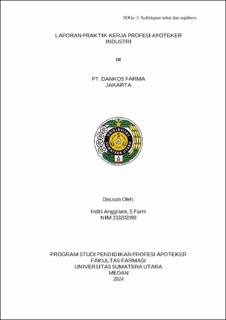| dc.contributor.advisor | Arianto, Anayanti | |
| dc.contributor.advisor | Irawan, Rendi Mulyadi | |
| dc.contributor.author | Anggriani, Indri | |
| dc.date.accessioned | 2025-03-17T02:09:04Z | |
| dc.date.available | 2025-03-17T02:09:04Z | |
| dc.date.issued | 2024 | |
| dc.identifier.uri | https://repositori.usu.ac.id/handle/123456789/102161 | |
| dc.description.abstract | Objective: Pharmacist Professional Internship (PKPA) is carried out with an effort to improve students' understanding of the roles and responsibilities of pharmacists in the pharmaceutical industry, provide students with insight and skills, learn Good Manufacturing Practices (CPOB) and their application in the pharmaceutical industry, and prepare students for the world of pharmaceutical work in the pharmaceutical industry.
Method: The Industrial Pharmacist Professional Internship (PKPA) of PT. Dankos Farma was implemented on August 19, 2024 - October 23, 2024. PKPA activities carried out at PT. Dankos Farma include placement in Production and gaining an understanding of other departments at PT. Dankos Farma.
Results: The production department in the pharmaceutical industry plays an important role in ensuring the implementation of high standards to produce quality products. One of the most important aspects that must be implemented in the production process is CPOB (Good Manufacturing Practice) and GMP (Good Manufacturing Practice). Both are guidelines applied in the drug production process, starting from receiving raw materials, each stage of the drug production process to packaging the final product. In the production department, pharmacists play a role in ensuring that the entire process runs according to CPOB and GMP provisions which include supervision of the cleanliness of facilities, equipment and production environments, as well as the implementation of strict standard operating procedures (SOPs) to achieve production targets with quality that meets the safety and quality requirements of the products set. Pharmacists in the production department also play a role in monitoring quality at every stage of production by implementing ipc (in process control) so that the product meets the specifications set by QC (Quality Control), with the implementation of ipc can identify potential errors as early as possible as a form of quality control and quality assurance, and provide solutions to maintain product consistency to meet applicable standards.
Conclusion: PT. Dankos Farma has implemented CPOB aspects well in every aspect and series of its production processes. | en_US |
| dc.language.iso | id | en_US |
| dc.publisher | Universitas Sumatera Utara | en_US |
| dc.subject | Pharmaceutical industry | en_US |
| dc.subject | PT. Dankos Farma | en_US |
| dc.subject | Production | en_US |
| dc.subject | GMP (Good Manufacturing Practices) | en_US |
| dc.title | Laporan Praktik Kerja Profesi Apoteker Industri di PT. Dankos Farma Jakarta | en_US |
| dc.title.alternative | Apothecary Professional Work Practice Report of Pharmaceutical Industry in PT. Dankos Farma Jakarta | en_US |
| dc.type | Thesis | en_US |
| dc.identifier.nim | NIM233202099 | |
| dc.identifier.nidn | NIDN0025065301 | |
| dc.identifier.kodeprodi | KODEPRODI48901#Pendidikan Profesi Apoteker | |
| dc.description.pages | 105 Pages | en_US |
| dc.description.type | Karya Tulis Profesi | en_US |
| dc.subject.sdgs | SDGs 3. Good Health And Well Being | en_US |


